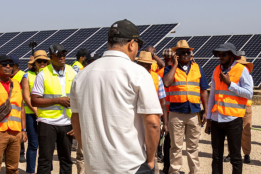How do we build cities of the future that thrive on modern energy sources, cleaner air, and greener transport systems? Through its financing of urban programs, CIF’s Clean Technology Fund (CTF) is moving us closer to achieving these goals, as a new study, illustrates.
Cities are home to about 50 percent of the world’s population but account for 70 percent of global emissions, according to the IPCC. The impacts of rising sea levels, extreme weather events, or heavy pollution, for example, are a constant threat to urban people and their environments.
The latest study in our Results Deep Dive series, “CTF Contributions to Sustainable Urbanization: An in-depth analysis of the CTF’s work in urban areas” – shows how CTF financing has supported energy, transport, and infrastructure projects in low- and middle-income countries. In transport, for example, it has supported affordable, low-carbon alternatives for almost half a million people. The result is over 117,000 tCO2 in annual GHG emission reductions across Asia and South America – the same as emitted by more than 800 million kilometers of driving.

The study also highlights how CTF investments have reduced travel times for millions of journeys. For example, in the city of Armenia in Colombia, the Strategic Public Transportation Systems Program (SETP) has cut the average public transport travel time from almost 38 minutes to under 28 minutes. CTF invested $11.4 million in the SETP.
Illustrating the diversity of urban project financing, CTF financing is helping to modernize heating systems across cities in Kazakhstan, improving the lives of urban residents across the country. The District Heating Modernization Framework (DHMFF) has boosted system reliability and led to over 158 GWh in annual energy savings. On completion, it is expected to cut heat losses by 10 percent and increase private sector participation in the delivery of heat supply.

In Vietnam, the Distribution Efficiency Project employed smart grids to upgrade power supplies in Hanoi and Ho Chi Minh City. The project generated more than $600 million in co-financing from a CTF funding of about $20 million and led to 449 GWh in annual energy savings.
A few key facts:
- Urban transport represents over 87 percent of the transport projects in the CTF portfolio, ranging from electric river boats to first-of-a-kind large-scale subway systems.
- 434,000 people in low- and middle-income countries now use low carbon public transportation as a result of CTF finance.
- CTF urban projects had catalyzed over 3,481 GWh in annual energy savings, since December 2023.
Urban projects account for more than 16 percent of CTF’s portfolio, drawing in co-financing of over USD$5.6 billion. This demonstrates how the fund’s early investment can unlock additional funding to pilot and scale clean technologies in developing countries. CIF’s Results Deep Dive series is a supplement to our annual results reports, providing in-depth reviews within specific thematic or developmental dimensions of climate change.




